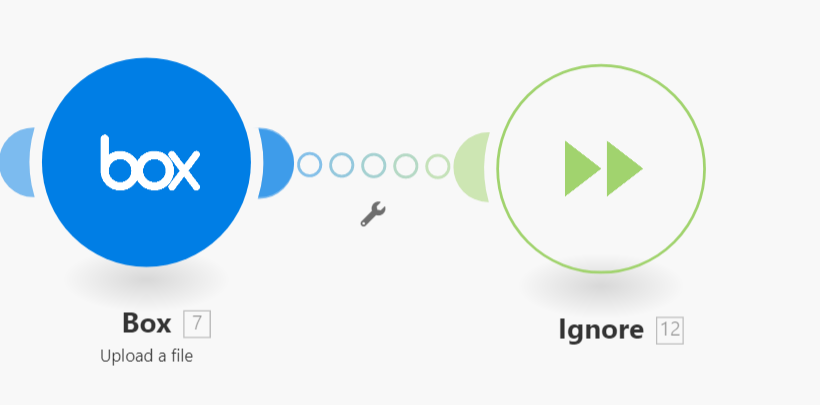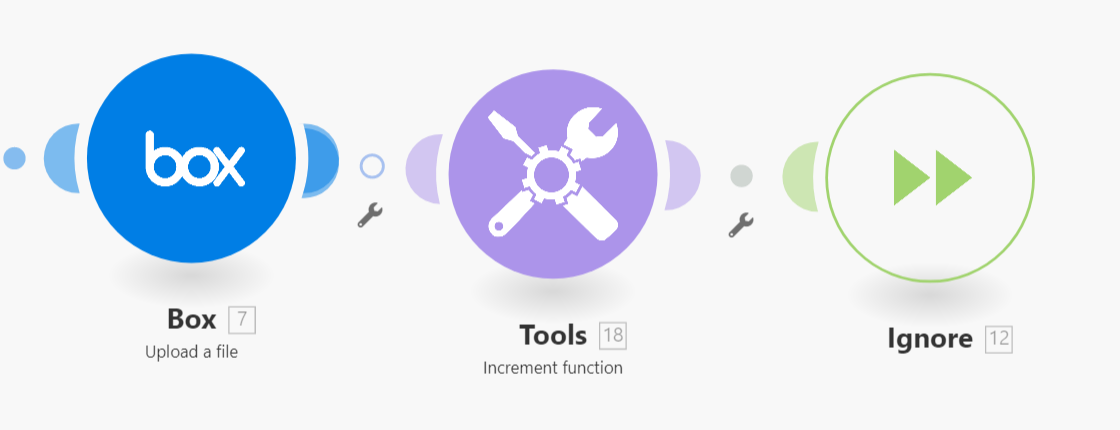Box
With Box modules in Make, you can manage the files, folders, sign requests, content, and comments in your Box account.
To use the Box modules, you must have a Box account. You can create an account at box.com.
Refer to the Box API documentation for a list of available endpoints.
Connect Box to Make
To establish the connection:
Log in to your Make account, add a Box module to your scenario, and click Create a connection.
Optional: In the Connection name field, enter a name for the connection.
Optional: Click Show Advanced Settings and enter your custom app client credentials. For more information, see the Box Custom App documentation.
If requested, use the following Redirect URI when creating your custom app:
https://www.integromat.com/oauth/cb/box2.Click Save.
If prompted, authenticate your account and confirm access.
You have successfully established the connection. You can now edit your scenario and add more Box modules. If your connection requires reauthorization at any point, follow the connection renewal steps here.
Build Box Scenarios
After connecting the app, you can perform the following actions:
New File Event
Watch Files
Get a File
Download a File
Upload a File
Add a Shared Link to a File
Update a File
Rename a File
Delete a File
Create File Metadata Instance
Get File Metadata
Update File Metadata
New Folder Event
Create a Folder
Add a Shared Link to a Folder
Get a Folder
Update a Folder
Rename a Folder
Delete a Folder
Create Folder Metadata Instance
Get Folder Metadata
Update Folder Metadata
Get Folder Items
Get a Sign Request
List Sign Requests
Create a Sign Request
Cancel a Sign Request
Make an API Call
Search for Content
Get a File/Folder by Shared Link
Create a Comment
Copy a Folder
Troubleshooting
There are several situations when downloading a file fails:
The current file lock settings do not allow the file to be downloaded or the downloading of the file is disabled. In this case, the file is ignored.
When the scenario started, the file was being uploaded to the server and was not ready to be downloaded. The scenario run gets stopped and Make will try downloading the file again during the next execution of the scenario.
There are several situations when uploading or updating a file fails:
The uploaded file is too big and exceeds the maximum file size limit for your Box plan, or you have used all of your Box account's storage quota. To get more storage space, delete existing files from Box or upgrade your Box account.
Box does not allow you to upload any two files with the same name to one single folder. If the destination folder contains a file with the same name as the file being uploaded, the scenario run terminates with an error. The solution is simply to rename the file. If you aim to update the file, use the Update a file module.
Tips
Automatically rename two uploaded files in Box with the same name
To automatically rename each file with a unique name, create the following scenario:
 |
Add the Ignore error handler module after the Upload a file module: This means if a file exists with the same name in Box, the error will be ignored instead of the scenario failing and stopping.
 |
Once you have added the Ignore error handler, add the Increment function module. This is used to uniquely identify files that have the same name. Drag and place the Increment function module between the Box Upload a File module and the Ignore error handler module.
 |
Once done, configure the module.
Clone the Upload a file module so that you do not have to remap it. Add the cloned Upload a file module in between the Increment function module and the Ignore error handler module.
 |
You can configure the cloned Upload a file module to include the file name with the extension. For example, invoice.xml.